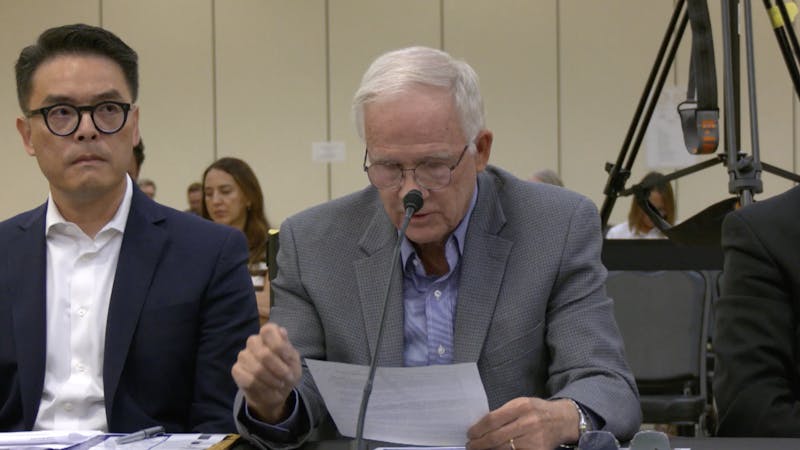LPAP POD debates requirement
The SA Senate will continue evaluating the Lifetime Physical Activity Program requirement, especially for student athletes.
According to LPAP Pod member Andy Yuwen, the Pod advised the SA Senate to create a committee to look into this issue further.
“I would describe the current state of the LPAP as a requirement that attempts to fulfill an idealistic goal, and could do with some adjustments,” Yuwen, a Lovett College freshman, said.
LPAP: Past
In February 2012, the Thresher reported the SA was evaluating the LPAP requirement. After discussion, the Faculty Senate changed the LPAP requirement from a two-credit requirement to only one.
“In the spring of 2012, the SA worked with the Recreation Center to conduct a brief survey of the undergraduate population to determine the usefulness of the LPAP requirement,” Associate Director of Recreation Center Programs Elizabeth Slator said. “It was overwhelmingly supported, but most students wished to have the requirements changed from two classes to one. ”
Slator said Rice has had a physical education program in one form or another since it was founded in 1912. Originally, LPAPs and all of the Recreation Center was under the Kinesiology Department, until 2001, when Recreation became its own department and gained control of the LPAP program.
John Boles (Will Rice ’65), the William P. Hobby Professor of History and author of three books on Rice’s history, said during his time at Rice, what is now called the LPAP was a required, year-long course that introduced students to a variety of recreational activities.
“The idea [was] many of them would have had no experience with some of these sports, and that hopefully, people would find one or more [activities] that they would be able to participate in the rest of their lives,” Boles said.
LPAP: Future
According to Slator, LPAP course offerings have evolved with the student interest, fitness trends and the availability of space.
Slator said she thinks it is important to continually evaluate the effectiveness of LPAP instructors and the courses offered. However, she said she does not think it is necessary to continue a conversation about the LPAP requirement.
“It has been decided repeatedly, and I do mean repeatedly, by both the Faculty Senate and the Student Association that the LPAP requirement should stand,” Slator said.
Slator said most individuals, especially American college students, do not participate in physical activity that provides health benefits.
“Given the tremendous amount of stress that Rice students suffer from and [its] physiological and psychological ramifications, offering courses that can potentially alleviate this problem are imperative,” Slator said.
LPAP Pod Discussion
According to Yuwen, a small, rudimentary poll revealed the majority of the student community is strongly against a mandatory LPAP requirement for athletes, but almost all supported an option for student-athletes to take LPAP courses. Yuwen said within the Pod, he was the only supporter of removing student-athletes’ LPAP requirement.
Yuwen said the main arguments in support of athletes’ LPAP requirement are to preserve their fifth year of eligibility by taking their LPAP requirement in their fifth year, to connect to the community and to demonstrate a full commitment to all aspects of lifetime fitness.
“Student athletes at other universities pursue Master’s degrees or leave other major requirements for their fifth year of eligibility,” Yuwen said. “Not all student athletes feel disconnected from the community. Some choose to associate themselves with the team, and an optional LPAP requirement would solve this potentially perceived problem. The final argument [is one] I found blatantly disrespectful to Rice’s student-athletes. In my opinion, every Rice student-athlete has demonstrated enough commitment to lifetime fitness to at least be considered for exemption from the LPAP requirement.”
Student Opinions
According to Rice swimmer Taylor Armstrong, exercise is an important component in life, and the LPAP should be a Rice requirement.
“Students forget that life consists [of things] outside of studying,” Armstrong, a Martel College junior, said. “Rice students forego their health for good grades, and taking an LPAP is a good reminder and introduction to healthier living.”
However, Armstrong said she thinks the LPAP should be optional for athletes.
“I know this may seem like a double standard, but we literally work out six days a week for a minimum of 2.5 hours at a time anyway,” Armstrong said. “Making [the LPAP] a requirement adds extra pressure and stress for us to fulfill graduation requirements that we don’t necessarily need.”
Fifth-year senior Gabe Baker, a safety on the Rice football team, said he thinks LPAPs are an important component of the Rice experience but should not be required for athletes.
“They do provide the opportunity for athletes to save the LPAP required class for their last, redshirt semester, like myself,” Baker, a resident of Brown College, said. “The only problem is the difficulty with registering and getting into an LPAP. If they gave a higher priority to students who need to fulfill their requirement, that would be better.”
More from The Rice Thresher

Rice announces Chao College as 12th residential college
Rice announced that the 12th residential college will be named Ting Tsung and Wei Fong Chao College Aug. 19. The college, set to open in fall 2026, will contain nearly 300 on-campus beds.
Dining access fund announced following on-campus unlimited meal swipes
Rice announced new food assistance programs on Tuesday to account for the controversial change in the on-campus meal swipe plan.

Rice disaster prediction model discussed at hearing on deadly Central Texas floods
The House and Senate Select Committees on Disaster Preparedness and Flooding held a hearing on July 31 in Kerrville to address the deadly July 4 flooding in Central Texas. The flooding along the banks of the Guadalupe River killed 108 people, including 37 children. In the charged hearing, Texas lawmakers and flood survivors criticized the local response to the disaster.


Please note All comments are eligible for publication by The Rice Thresher.